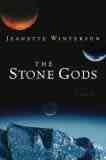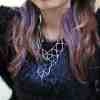Science Fiction and Fantasy
The Stone Gods by Jeanette Winterson

- The Stone Gods
- Harcourt, 224 pp.
Finding Love in a Dystopian Future
Jeanette Winterson’s latest novel, The Stone Gods, is a science-fiction novel-within-a-novel adventure and might come as a pleasant surprise to the fans who have seen her through the days of feast then famine. Some may have even become disillusioned with her output since Gut Symmetries and if so, this publication will be a relief as well as a pleasure as she mostly avoids depending on the light touch that has seen her through for the last 10 years or so.
Saying that, this is still undoubtedly marked with the Winterson branding iron. Even though science fiction is a new stylistic turn, and the strong dose of ecocriticism that permeates this novel has until now been sidelined into her non-fiction, the abandoned child narrator and the always dominant theme of love are brought in again and re-fashioned as they have in all her novels, from the semi-autobiographical Oranges are not the Only Fruit onwards.
The Stone Gods takes its title from the Easter Island statues and this reference invites us to consider the wider point of humans not learning from their mistakes: ‘That one thing should stand for another is no harm, until the thing itself loses any meaning of its own. The island trees and all of this good land were sacrificed to a meaning that has now become meaningless. To build the Stone Gods, the island has been destroyed, and now the Stone Gods are themselves destroyed.’ The narrative drives home how the main impact of this will to self-destruction is now evident in the global scale of pollution.
It begins in the future, where ‘this new world weighs a yatto-gram’, goes back to 1774 and then comes forward to either another future or a variation on the present immediately after World War Three. It is not until this final section that the readers learn that this has been a novel inside another novel. The narrator, Billie Crusoe, has been explaining the suffering she has undergone as an adopted child and exploring the relationship this theme has with the pollution of the planet. As unappealing as this may sound, the connection is not contrived. Billie’s view of the world is shaped by her childhood and her story of how the past influences and corrupts the present is given both in her memories and in the detail of the broader canvas that describes the destruction of the environment.
Of all the many love stories Winterson has told, the one about Billie and her biological mother is the most surprising and to date the most moving. It is in these passages that describe Billie’s memories in the womb and the 28 days she spent with her mother (as a newborn baby) that Winterson engages fully with her recurring interest in the adopted child and even attempts to understand the situation from the position of the mother: ‘I know she came back to change her mind, but it was too late, because she had signed the papers, and although manuscripts get lost as readily as children, official papers hold fast their dull and damaging life. What’s best to throw away? The paperwork or the love? It’s in the best interests of the child – but how do they know that, or the meaning of any of those separate worlds? Best. Interest. Child.’ Billie also relates how the adoption has left her with an unquenchable desire to continue searching for her mother, and it is here that the child’s sense of loss is translated into the adult’s search for love.
By having love as an underpinning theme, there is always the possibility that the novel may be accused of being solipsistic or conservative. As The Stone Gods looks at the outside world as well as the inner life, and considers a future where the planet is marching to its death, this could be seen as an unfair criticism. Such conservativeness has long been apparent in Winterson’s work, however, and when Billie discusses emotionalism and argues without irony that some women have found it hard juggling career and family and, consequently, have neglected their children it becomes apparent that the same value system is in place.
Rather than condemning the capitalist system that thrives in these imagined and real worlds, Winterson stops short and looks to love as a solution. This is, of course, a work of fiction and not an essay about halting the output of greenhouse gases, but when it sets out to examine the inevitability of a dystopian future, it is at least a surprise that love continues to be the panacea. If one is able to put aside these inconsistencies, it is likely that this will be a pleasure to read.
Julie Ellam received her Ph.D. in English Literature from Hull University. Her work has appeared in numerous publications including the “Times Literary Supplement.” She also writes a blog about television – “tellyjelly.” Julie currently resides in Hull, England.






You must be logged in to post a comment Login